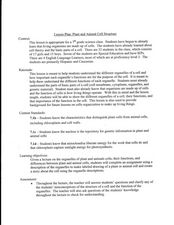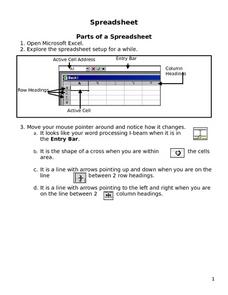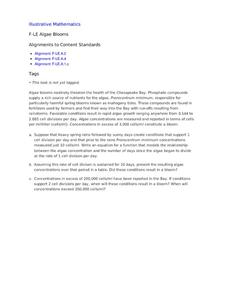Science Matters
Hierarchy
A system is only as good as the sum of its parts! Young scholars explore the components of the different body systems using a hands-on instructional activity. The instructional activity helps learners build an understanding that there is...
Teach Engineering
Android Acceleration
Prepare to accelerate your Android. Pupils prep for the upcoming activity in this third installment of a four-part series. The lesson progresses nicely by first introducing different types of acceleration to the class. The teacher...
Curated OER
Parts Wanted: Advertising for Cell's Organelles
Seventh graders name the parts of the cell. Students demonstrate knowledge of the parts of a cell in reference to cell functions. They apply their knowledge of the cell and the cell parts to a real world situation.
Curated OER
Plant and Animal Cell Structure
Seventh graders identify the different parts and functions of the cell. In this biology lesson, 7th graders make a labelled diagram of either a plant or animal cell. They write a story about it.
Curated OER
Seeing Cells
Sixth graders study living cells and their functioning units. In this cell lesson students color cell diagrams, answer questions and discuss the differences between plant and animal cells.
Curated OER
Cell Organelles and Their Functions
Students will be using Inspiration, which is a graphic organizer computer program, to create their own model community where they will label the community parts with the corresponding organelle. They will have prior knowledge of cell...
Curated OER
Parts of a Spreadsheet
Learners experiment with the basic functions of a spreadsheet. They practice using headers, footers, functions and fonts. They also organize information.
Curated OER
Plant Structure and Function
With a few minor formatting changes, the plant parts and processes resource here would make a great study guide, quiz, or self assessment. Currently, it is a bit confusing, but changing some lettering to numbering would clear up any...
Curated OER
Parts of a Spreadsheet
Students create their own spreadsheet. They identify the different parts that make up a spreadsheet and organize their data. They practice using functions and formats.
Curated OER
Cell Works
Students identify the different parts of the cells and their functions. In this biology activity, students create an analogy of a cell and its organelles. They make a poster and present it to class.
Curated OER
Cell Community
Seventh graders use technology to review cell structure and function. In this cells less, 7th graders review the parts and functions of a cell, and use photography/video and PowerPoint to enhance their explorations.
Curated OER
Drawing a Plant Cell
In this cell structures worksheet, students draw a plant cell. Students draw and label all of the parts listed in the word bank. Students then identify each part by coloring it the color indicated in the word box.
Virginia Department of Education
The Ratio of Surface Area to Volume
Demonstrate the ratio of surface area to volume in your high school class by using phenolphthalein, gelatin, and an onion. Intrigue the class by leading a discussion on osmosis and diffusion, then making "scientific jello." Participants...
Nuffield Foundation
Observing Water Moving Through Plants
We know plants assist in the water cycle, but how do plants get water from the ground into the air? Through a series of demonstrations or labs, scholars observe the movement of water through plants. They microscopically view the cells...
Curated OER
Raven Chapter 35 Guided Notes: Plant Form
The ups and downs of plant vascular tissue are described by your beginning botanists as they complete this worksheet. Xylem and phloem are defined and identified on actual color photographs. Functions of the different types of meristem...
Ask a Biologist
Neuron Anatomy Activity
Reinforce the neural connections in the brains of your young biologists with a simple anatomy instructional activity. Looking at the provided diagram of a neuron, learners are asked to correctly identify and describe the...
Curated OER
Eukaryotic Animal Cell, Candy Cell Model: Science
Middle schoolers review the parts of the eukaryotic animal cell and construct a model using various types of candy.
Curated OER
Cells
In this biology activity, students use the clues given at the bottom of the sheet to complete the crossword puzzle on cells. There are 22 clues to solve in the puzzle on cells.
American Society for Microbiology
”Build a Bacterium” Scavenger Hunt
An exciting activity has scholars use cell parts to build bacteria through cooperation with other groups. Each group has some of the cell parts needed, but they must trade with other groups to be able to fulfill their function as a...
Curated OER
Algae Blooms
Your microbiologists explore a changing algae population and build an exponential function modeling algae concentration from the description given of the relationship between concentrations in cells/ml and days of rapid growth.
Nuffield Foundation
Investigating Transport Systems in a Flowering Plant
Some weddings have flowers in a unique, unnatural color to match the theme. Young scientists take part in this process to learn about the function of the xylem as they observe colored water moving through a flower. Then, they experiment...
Forest Foundation
The Nature of Trees
Young botanists examine the different parts of tress and then draw parallels between the functions of these parts and the function of parts of the human body.
Curated OER
Regents High School Examination: Living Environment 2005
The 2005 version of the Regents High School Examination in the area of ecology is as comprehensive as previous years' exams. It consists of 40 multiple choice questions on everything from the structure of DNA to the interactions within...

























